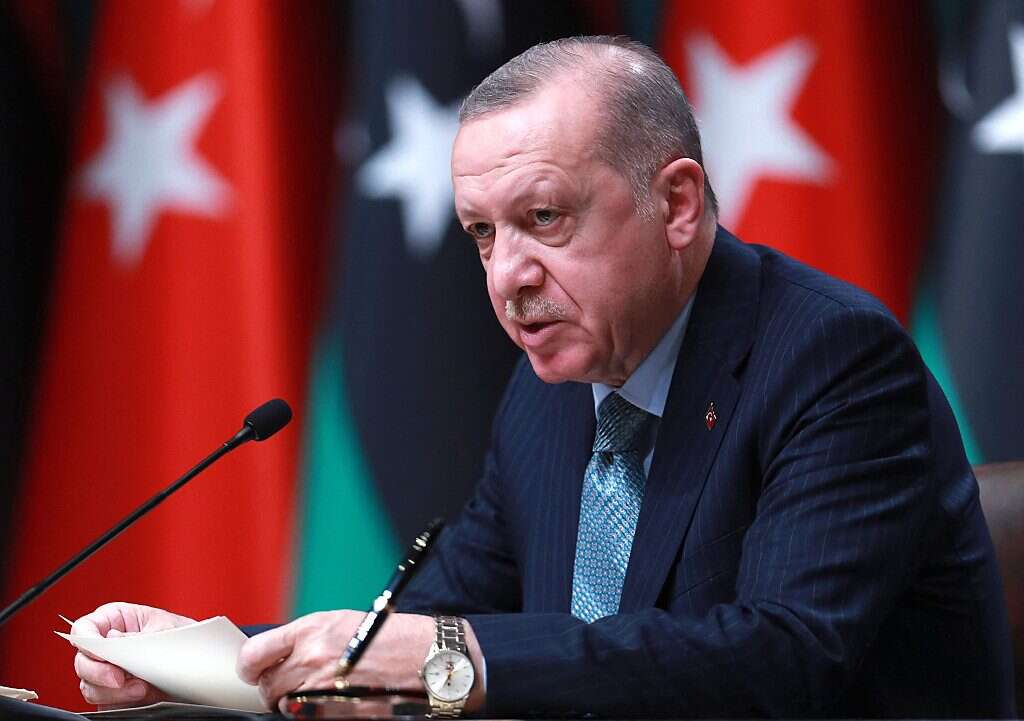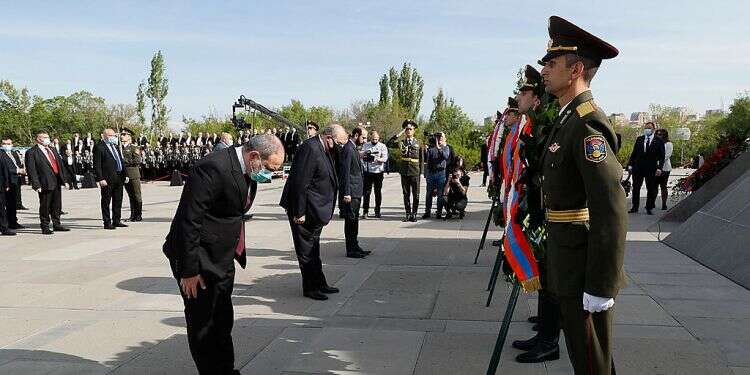The systematic killing and deportation of more than a million Armenians by Ottoman Empire forces in the early 20th century was "genocide," the United States formally declared on Saturday, as President Joe Biden used that precise word after the White House had avoided doing so for decades for fear of alienating ally Turkey.
Follow Israel Hayom on Facebook and Twitter
Armenia on Saturday marked the anniversary of the 1915 rounding up of some 250 Armenian intellectuals, regarded as the first step in the killings that lasted until 1923. A grateful Armenia said it appreciated Biden's "principled position" as a step toward "the restoration of truth and historical justice," as the country's leaders praised Washington's recognition of the genocide, calling it "a powerful step."
Prime Minister Nikol Pashinyan's said the move "reaffirms the supremacy of human rights and values in international relations. From this point of view, it is an inspiring and inspiring example for all who want to build a just and tolerant international society together.
"I highly appreciate your principled position, which is a powerful step towards the restoration of truth and historical justice, invaluable support to the descendants of the victims of the Armenian genocide," he said in a message to Biden.
Turkey reacted with furor.
Ankara vehemently rejected the genocide label, conceding that many died in that era, but insisting that the death toll is inflated and the deaths resulted from civil unrest.
The Turkish Foreign Ministry issued a statement saying, "We reject and denounce in the strongest terms the statement of the president of the US regarding the events of 1915 made under the pressure of radical Armenian circles and anti-Turkey groups. We will not be given lessons on our history from anyone."

Azerbaijan, which was supported by Turkey in the war, also criticized Biden's recognition of the genocide.
"While misrepresenting the events that happened 100 years ago, the failure to give a fair assessment of the genocide committed by Armenia against Azerbaijanis in Khojaly 30 years ago is an example of bias and double standards," Azerbaijan's Foreign Ministry said in a statement.
More than 200 Azeris were killed by Armenian forces in 1992 in the town of Khojaly during fighting over the Nagorno-Karabakh region.
Biden was following through on a campaign promise he made to recognize that the events that began in 1915 were a deliberate effort to wipe out Armenians.
While previous presidents have offered somber reflections of the dark moment in history, they have studiously avoided using the term genocide out of concern that it would complicate relations with Turkey, a NATO ally and important power in the Middle East.
But Biden campaigned on a promise to make human rights a central guidepost of his foreign policy. He argued last year that failing to call the atrocities against the Armenian people a genocide would pave the way for future mass atrocities. An estimated 2 million Armenians were deported – 1.5 million of whom were killed in the events known as Metz Yeghern.
"The American people honor all those Armenians who perished in the genocide that began 106 years ago today," Biden said in a statement. "We affirm the history. We do this not to cast blame but to ensure that what happened is never repeated."
Minutes before Biden's announcement, Turkish President Recep Tayyip Erdogan sent a message to the Armenian community and patriarch of the Armenian church calling for not allowing "the culture of coexistence" of the Muslim Turks and Christian Armenians to be forgotten. He said the issue has been "politicized by third parties and turned into a tool of intervention against our country."
The US Embassy and consulates in Turkey issued a demonstration alert, and announced their offices would be closed for routine services on Monday and Tuesday as a "precautionary measure." They cautioned Americans to avoid areas around U.S. government buildings and exercise caution in locations where foreigners gather.
The US and Turkish governments, in separate statements following a phone call between Biden and Erdogan on Friday, made no mention of the American plan to recognize the Armenian genocide. But the White House said Biden told Erdogan he wants to improve the two countries' relationship and find "effective management of disagreements." The two also agreed to hold a bilateral meeting at the NATO summit in Brussels in June.
In Armenia on Saturday, people streamed to the hilltop complex in Yerevan, the capital, that memorializes the victims. Many laid flowers around the eternal flame, creating a wall of blooms two meters (seven feet) high.
Armenian Deputy Foreign Minister Avet Adonts, speaking at the memorial before Biden issued his statement, said a US president using the term genocide would "serve as an example for the rest of the civilized world."
Biden's call with Erdogan was his first since taking office more than three months ago. The delay had become a worrying sign in Ankara; Erdogan had a good rapport with former President Donald Trump and had been hoping for a reset despite past friction with Biden.
Lawmakers and Armenian American activists had lobbied Biden to make the genocide announcement on or before remembrance day. The closest that a US president had come to recognizing the World War I-era atrocities as genocide was in 1981 when Ronald Reagan uttered the words "Armenian genocide" during a Holocaust Remembrance Day event. But he did not make it US policy.
House Speaker Nancy Pelosi, a California Democrat, lamented that "the truth of these heinous crimes has too often been denied, its monstrosity minimized."
"History teaches us that if we ignore its darkest chapters, we are destined to witness the horrors of the past be repeated," she added.
Rep. Adam Schiff, also a California Democrat, praised Biden for following through on the pledge.
"For Armenian-Americans and everyone who believes in human rights and the truth, today marks an historic milestone: President Biden has defied Turkish threats and recognized the slaughter of 1.5 million Armenians for what it was – the first genocide of the 20th Century," Schiff said in a statement.
Subscribe to Israel Hayom's daily newsletter and never miss our top stories!




